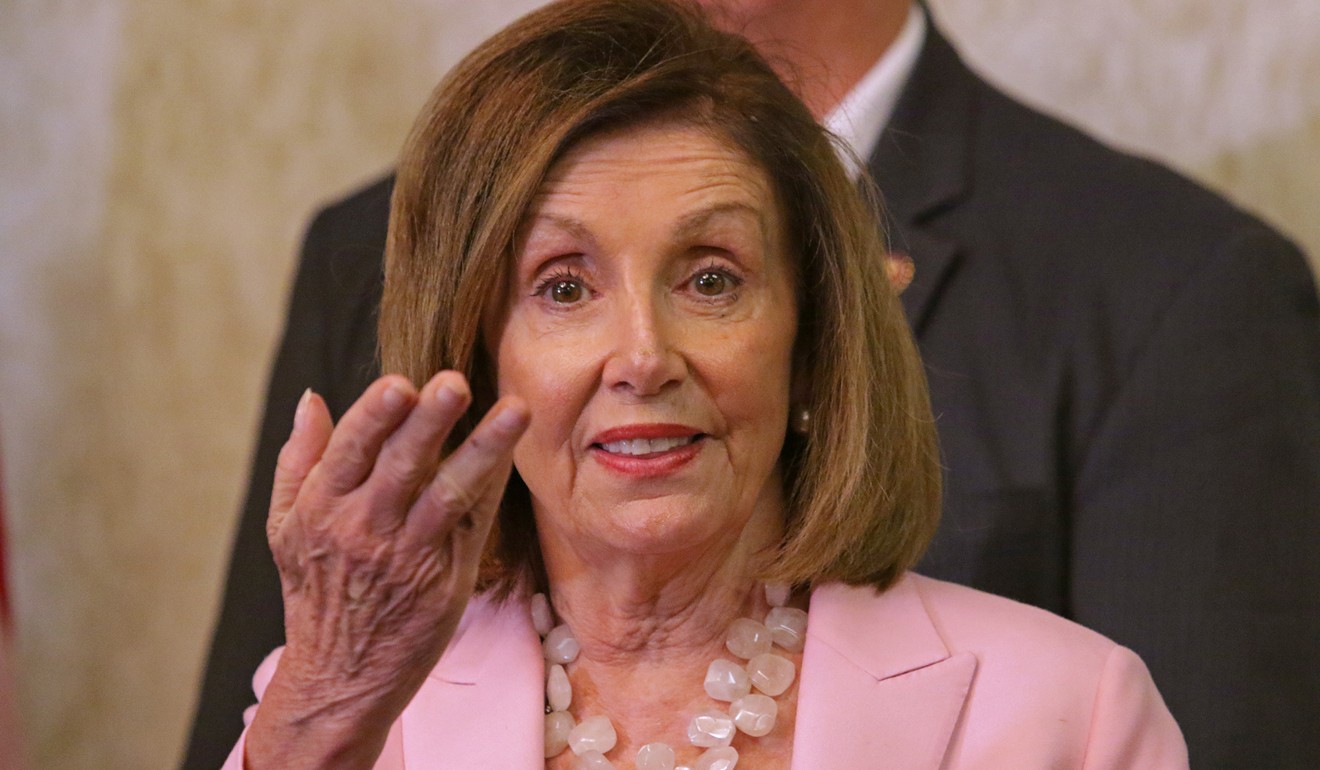
Democrats subpoena White House as Donald Trump signals he won’t cooperate on impeachment investigation
- Move widens probe into constitutional battle between executive branch and Congress
- Trump expected to formally object to inquiry and push for House vote he hopes will hurt Democrats at the polls
Trump said he would formally object to the impeachment investigation, even as he acknowledged that House Democrats “have the votes” to proceed. Democrats warned Trump is “on a path of defiance, obstruction and cover-up” and said defying their subpoena would be considered “evidence of obstruction”, potentially an impeachable offence.
The White House was expected to send a letter to House Speaker Nancy Pelosi arguing that Congress could not mount its impeachment inquiry without first having a vote to authorise it. The letter was expected to say the administration would not cooperate with the probe without that vote.
Trump said the resolution would likely pass the House, but he predicted it would backfire on Democrats.
“I really believe that they’re going to pay a tremendous price at the polls,” he said.
Three Democratic chairmen – congressmen Elijah Cummings, Adam Schiff and Eliot Engel – warned Trump in a letter accompanying their subpoena, stating: “Speaker Pelosi has confirmed that an impeachment inquiry is under way, and it is not for the White House to say otherwise.”
Trump’s comments came shortly before Democrats sent an extensive request for documents to Vice-President Mike Pence about his contacts with Ukraine.
Lawmakers have made Trump’s request that Ukraine investigate former vice-president Joe Biden the centrepiece of the probe. A whistle-blower complaint said that Trump sought to use military aid for Ukraine to push President Volodymyr Zelensky to investigate the 2020 Democratic hopeful.
Stonewalling in impeachment probe could mean obstruction charges for Trump
The West Wing was set to allow a similar request for documents from the president’s staff to go unfulfilled Friday, likely forcing Democrats to make good on their threat to issue a subpoena for the records. Democrats have warned that the Trump administration’s obstruction of the investigation is itself a potentially impeachable office.
Pence spokeswoman Katie Waldman dismissed the new demand for documents, saying that given its wide scope, “it does not appear to be a serious request”.
When Pelosi recently announced that the House was initiating the inquiry, she did not seek the consent of the full chamber, as was done for impeachment investigations into former presidents Richard Nixon and Bill Clinton.
But it is under way, and at a rapidly escalating pace.

Late on Thursday, House investigators released a cache of text messages that showed top US diplomats encouraging Ukraine’s newly elected president to conduct an investigation linked to Biden’s family in return for granting a high-profile visit with Trump in Washington.
Trump repeated on Friday that he was pressing Ukraine to investigate corruption, not trying to undermine Biden, who could be his 2020 presidential election opponent. He made a related request of China, specifying Biden and his son, on Thursday.
As Republicans search for a response to the investigation, the absence of a procedural vote to begin the probe has been a main attack line against Democrats.
Explained: Trump’s US$1.5 billion claims and Biden son’s dealings in China
Pelosi swatted the need for such a vote back as unnecessary, saying the House is well within its rules to pursue the inquiry without it.
“The existing rules of the House provide House Committees with full authority to conduct investigations for all matters under their jurisdiction, including impeachment investigations,” Pelosi wrote on Thursday in a letter to House Republican Leader Kevin McCarthy after he, too, pressed for a floor vote.
Pelosi has sought to avoid a vote on the impeachment probe for the same reason she resisted, for months, liberal calls to try to remove the president: it would force moderate House Democrats to make a politically risky vote.
The White House, meanwhile, is trying to force the question on Democrats, as it seeks to raise the political cost for their impeachment investigation and to animate the president’s supporters ahead of the 2020 election.

Trump allies have suggested that without a formal vote, the House is merely conducting standard oversight, entitling lawmakers to a lesser level of disclosure from the administration. The Justice Department raised similar arguments last month, though that was before Pelosi announced the impeachment investigation.
Two days after telling reporters, “Well, I always cooperate,” Trump struck a different note on cooperating with the House probe. “I don’t know,” he said. “That is up to the lawyers.”
There’s no clear-cut procedure in the Constitution for initiating an impeachment inquiry, leaving many questions about possible presidential obstruction untested in court, said Allan Lichtman, a history professor at American University.
“There’s no specification in the Constitution in what does and does not constitute a more formal impeachment inquiry or investigation,” he said.
Trump denies quid pro quo with China on trade deal and Biden inquiry
Rudy Giuliani, the president’s personal lawyer, dismissed the entire premise of the impeachment inquiry.
“The president was not tasking Ukraine to investigate a political opponent,” Giuliani said on Thursday. “He wanted an investigation into a seriously conflicted former vice-president of the United States who damaged the reputation of the United States in Ukraine.”
Democrats have sought to use their declared impeachment investigation to bolster their case to access all sorts of documents from the administration, most recently secret grand jury information that underpinned special counsel Robert Mueller’s report on Russian interference in the 2016 election.

They have also threatened to use the administration’s refusal to turn over documents and make witnesses available to potentially form an article of impeachment over obstruction of the congressional inquiry.
Where courts have generally required congressional oversight requests to demonstrate a legitimate legislative purpose, impeachment requests could be wide-ranging.
It is unclear if Democrats would wade into a lengthy legal fight with the administration over documents and testimony – or if they would just move straight to considering articles of impeachment.

